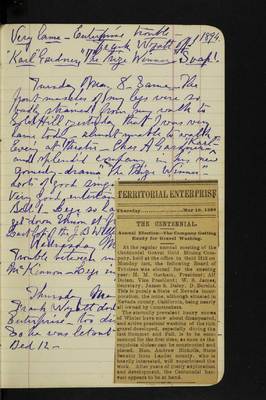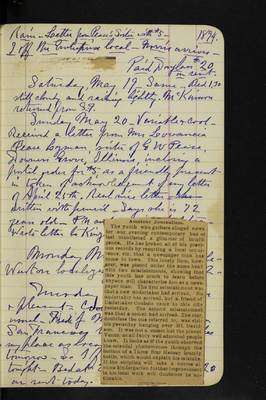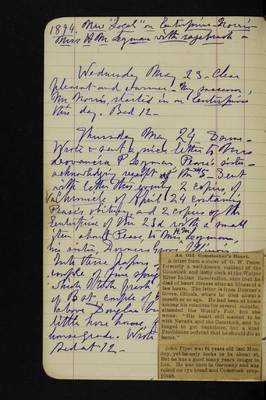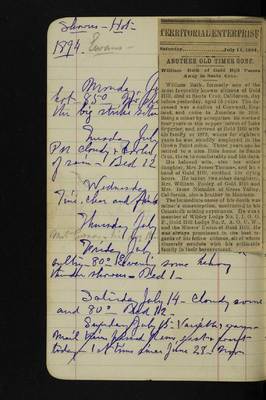Pages
70_059_c
TERRITORIAL ENTERPRISE. Thursday...May 10, 1894
THE CENTENNIAL
Annual Election -- The Company Getting Ready for Gravel Washing.
At the regular annual meeting of the Centennial Gravel Gold Mining Company, held at the office in Gold Hill on Monday last, the following Board of Trustees was elected for the ensuing year: H. M. Gorham, President; Alf Doten, Vice President; W. S. James, Secretary; James S. Daley, D. Borsini. This is purely a State of Nevada incorporation, the mine, although situated in Nevada country, California, being nearly all owned by Comstockers.
The eternally prevalent heavy snows of Winter have now about disappeared, and active practical washing of the rich gravel developed, especially during the last Summer and Fall, is to be commenced for the first time, as soon as the requisite sluices can be constructed and placed. Hon. Andrew Nicholls, State Senator from Lander county, who is heavily interested, will superintend the work. After years of costly exploration and development, the Centennial harvest appears to be at hand.
70_063_c
Amateur Journalism.
The youth who gathers alleged news for our evening contemporary has at last manifested a glimmer of intelligence. He has broken all of his previous records by reporting a local occurence, viz: that a newspaper man has come to town. This lonely item, however, was placed under the same head with two misstatements, showing that this youth has much to learn before anyone will characterize HIM as a newspaper man. The first misstatement was that a new undertaker had arrived. No undertaker has arrived, but a friend of Undertaker Conboie came to this city yesterday. The second misstatement was that a comet had arrived. The star, doubtless the one referred to, was visible yesterday hanging over Mt. Davidson. It was not a comet but the planet Venus, as all fairly well educated people knew. It looks as if the youth observed the celestial phenomenon through the bottom of a Three Star Henesy brandy bottle, which would explain his mistake. If the stripling will take a course at some kindergarten further improvement in his local work will doubtless be noticeable.
70_064_c
An Old Comstocker's Heart.
A letter from a sister of G. W. Pease, formerly a well-known resident of the Comstock and lastly clerk at the Walker River Indian Reservation, says that he died of heart disease after an illness of a few hours. The letter is from Downer's Grove, Illinois, where he died about a month or so ago. He had been at home among his relatives for several months, attended the World's Fair, but she wrote: "His heart still seemed to be with Nevada and the Comstock, and he longed to get back there, but a kind Providence ordered that he should die at home."
John Piper was 64 years old last Monday, yet he only looks to be about 46. But he has a good many years longer to live. He was born in Germany and was raised on rye bread and Comstock croppings.
70_080_c
EVENING CHRONICLE. VIRGINIA CITY, NEVADA. THURSDAY...JULY 5, 1894
FOURTH OF JULY.
The Comstock Celebrates in Grand Style.
The 118th Anniversary of American Independence Passes Off Satisfactorily in This Locality -- A Fine Parade, Interesting Excercises and Exciting Games -- Good Weather and No Serious Mishaps -- A Brilliant Ball.
The Comstock celebration of the Fourth of July was one of the most brilliant, successful and generally enjoyable that has been held for a long period. The weather was salubrious -- neither too warm nor too windy -- and the observance of the day was nearly perfect in every respect.
Already on the evening of the third patriotic citizens were engaged in decorating their houses with flags and bunting and at an early hour on the morning of the Fourth the whole city was gay and resplendent with the national colors. Flags floated proudly over all the mines and many public and private buildings, and the national colors were visible at all points throughout the city. C street was bedecked with streamers and flags in a brilliant and lavish manner, and it presented a far-strectching vista of red, white and blue. The city wore a holiday appearance, and on every hand were preparations for the festivities of the day.
Early in the forenoon the streets were crowded with people, who came out to prominade and see the procession and the games. As usual a great many visitors were present from outside places, the morning train bringing a big load. The bursting and crackling of firecrackers and bombs enlivened the city, and the merry noise of the squeaking balloon and other infernal devices rended the firmament.
THE PROCESSION.
At a quarter past 12 the procession, which had formed on B street, moved south, to the ringing of the fire bell. It passed over the usual route on B and C streets and was reviewed and dismissed in front of Piper's Opera House. It was one of the best parades for a long time and when it traversed C street was witnessed by a multitude of people who crowded the sidewalks. The procession was lead by Sheriff James Quirk and deputies and Chief of Police Fraser and the police force, who looked well on horseback. Then came Grand Marshal Sharon and aides, presenting a fine appearance. Following the Grand Marshal came Governor Colcord and Staff, and Colonel Lord and First Regimental Staff. The gentlemen looked very imposing in their glittering uniforms. They were followed by the Artillery Band, Company A, N.N.G., with forty men, Company B, with fifty-two men, and Battery A, with forty men.
The militiamen looked soldierly and added much to the procession. After the milita came the G.A.R. Mexican Veterans Young Men's Institute, Virginia Fire Department, boys cavalcade, carriages containing officers of the day and citizens in carriages. These organizations and other features all made a fine showing. The music by the Artillery Band was inspiring and added much to the ensemble.
THE EXERCISES.
After the procession came the customary literary excercises, which were held from the balcony of the International Hotel. The exercises were opened with music by the band, which was followed by the Declaration of Independence, read by Bayard Bulmer. The grand old document was listed to with the usual interest. The poem, which was delivered by Miss Lillian Burke, was patriotic and inspiring, and the hearers of the young lady were deeply impressed. George D. Pyne delivered the oraton. It was a very interesting address and commanded the attention of the audience. It was replete with patriotic sentiments, and was delivered with effect.
THE POEM.
"Ye sons of Columbia who bravely have fought For those rights, which [un tained] from your sires had descended. May you long taste the blessings your valor has bought, And your sons reap the soils which your fathers defended. Mid the reign of mild Peace may your nation increase, With the glory of Rome and the wisdom of Greece; And ne'er shall the sons of Columbia be slaves, While the earth bears a plant, or the sea rolls its waves.
In a clime whose rich vales feed the marts of the word, Whose shores are unshaken by Europe's commotion. The trident of commerce should never be hurled, To incense the legitimate powers of the ocean. But should pirates invade, though in thunder arrayed, Let your cannon declare the free charter of trade.
The fame of our arms, of our laws the mild sway, Had justly ennobled our nation in story, 'Till the dark clouds of faction obscured our young day, And enveloped the sun of American glory. But let traitors be told, who their country have sold, And bartered their God for his image in gold, The ne'er shall the sons of Columbia be slaves, While the earth bears a plant or the sea rolls its waves.
While France her huge limbs bathes recumbent in blood, And society's base threats and wide dissolution, May Peace, like the dove who returned from the flood, Find an ark of abode in our mild constitution. But though peace is our aim, yet the loon we disclaim, If bought by our sovereignty, justice or fame.
'Tis the fire of the flint each American warns; Let Rome's haughty victors beware of collision: Let them bring all the vassals of Europe in arms; We're a world by ourselves, and disdain a division. While, with patriot pride, to our laws we're allied, No foe can subdue us, no faction divide.
Let Fame to the world sound America's voice; No intrigues can her sons from their government sever, Her pride is her Adams; her laws are his choice, And shall flourish till Liberty slumbers forever. Then unite heart and hand, like Leonidas' band, And swear to the God of the ocean and land. That ne-er shall the sons of Columbia be slaves, While the earth bears a plant or the sea rolls its waves!"
{Lack of space makes it necessary to cut out some of the poem, which though interesting throughout, is too long for publication entire.}
THE GAMES.
Immediately after the exercises came the games, which occupied the rest of the day. The races and various contests were very good, but it was difficult to get a view of them owing to people crowding into the streets. The judges and others who aided in the games deserve a vote of thanks for their efficient labors.
Following is a result of the various contests:
Tug of war between military teams, prize $25, 18 gallons of beer, box of cigars, box of cartidges -- Company B.
Two hundred yard race, open to all, first prize, $10 -- John Miller; second prize, box of cigars -- Phil Desmond; third prize, cigar holder -- W.H. Kearns.
Catching greased pig -- Lou Otten.
Old man's race, first prize, one gallon of whisky -- G. H. Baglin; second prize, 5 sacks of coke -- John Wadge.
Milk boys' race, first prize, $5 -- Chas. O'Connor; second prize, fruit dish and cream pitcher -- Ed McManus; third prize, pair suspenders and riding whip -- Richard Pope; fourth prize -- tie between Dan Desmond and H. Kinkead.
Wheelbarrow race, first prize, $5 -- John Miller; second prize, a fine hat -- Phil Desmond; third prize -- William Kennedy.
Sack race, first prize, $5 -- W. Piper; second prize, fruit dish and cream pitcher -- Phil Desmond; third prize; fancy inkstand -- Frank Lichenberg.
Three-legged race, first prize, $5 -- John Miller and John Farrell; second prize, two glass water pitchers -- James Sullivan and C. Fields.
Paiute wrestling match; prize $1 to each winner and an order for meat -- Grover Cleveland.
Boys' race, first prize, gold watchchain -- Joseph Bennetts; second prize -- baseball bat and shoes -- Horace Merkle; third prize, cake -- Thomas Whalen; fourth prize, fishing tackle -- Charles Pyne.
Girls' race, first prize, girl's hat, pair of slippers and a fine cake -- Pearl Newberger; second prize, girl's hat and work box -- Minnie E. Pettinger; third prize, card receiver and ornamental frame -- Mary Fissetti; fourth prize a fan and picture frame -- Emma Livingston.
Trotting race, prize $20 -- W. J. Mooney.
Squaw race, first prize, $2.50 -- Annie Rooney; second prize, silk handkerchief - Lilly Langtry; third and fourth prizes, orders for meat -- "The Two Little Girls in Blue."
Young ladies' race, first prize, fine dressing case and ten dancing lessons -- Miss Annie Duffy; second prize, lady's purse and picture frame -- Mrs. John Craise.
Military race, first prize, $5, ticket for dance and oyster supper for two -- Charles Fields, Emmets; second prize, pair of fancy vases and a bottle of cocktail cherries - James Sullivan, Emmets; third prize, box of cigars -- John Farrell, Battery; fourth prize, combination shaving cup -- Frank Litchenberg, Battery.
Boys' tug of war, prize, $5 -- Con. Virginia team.
The Indian pony race was declared off on account of the danger to bystanders. There was no bicycle race owing to no entries.
The CHRONICLE is indebted to R. J. Walker, the efficient Secretary of the Executive Committee and the Committee on Games, for the report of the results of the games.
INCIDENTS.
During the horse races a horseman ran into the crowd and knocked several people over, severely inuring Alfred Craze and John Murphy. Murphy was struck on his head and was rendered unconscious. Neither of them will suffer any permanent injury, however.
During the day a rumor that a fatal accident had occurred on the railroad crossing just this side of Carson was rife in this city. The report was to the effect that a rockaway occupied by a man and three women had been run into by the Odd Fellows' train from Virginia, and that one woman had been killed. There was no truth in the report. It was founded solely upon the fact that between Empire and Carson the horses hitched to the rockaway had been frightened by the train and the women alighted till after the train passed.
A balloon was sent up from C street during the afternoon, but was carried way to the east by the wind.
Hon. Daniel McMurchie was the observed of all observers as the procession went by. He was dressed enrampant in a nail keg hat and looked very chic. During the evening the city was enlivened by firecrackers and fireworks.
THE BALL.
The military ball at the Opera House in the evening, which closed the day's festivities, was brilliant in the extreme. The floor and the gallery was crowded and mirth and gaiety reigned supreme. Governor Colcord, Lieutenant Governor Poujade and staff officers were present and added to the dignity of the occasion. The dance lasted until a late hour and was greatly enjoyed.
CELEBRATION AT CARSON.
Reported to Have Been a Gratifying Success -- The Games, Parade and Exercises.
The Carson Fourth of July celebration and the Odd Fellows' picnic and reunion are reported to have been a most gratifying success by Comstockers who visited the Capital on Fourth. About twenty-five hundred people attended the picnic, and festivities went off without an incident to mar the occasion.
After the arrival of trains, bringing visitors from Reno and Virginia and way stations, the procession took place. As the Carson people stayed at home generally, and there were a great many visitors present, it was witnessed by a big crowd. It was very good and contained a unique feature in the shape of an imitation Pullman car turned upside down on a float, which was the object of much sympathetic comment. The literary exercises were very interesting, and the oration by Hon. C. C. Powning of Reno and the poem of Miss O. M. Zecherle of Virginia were of unusual merit. Mr Powning's discourse is pronounced by a prominent Comstocker to have been on of the ablest he has ever heard.
The most interesting feature of the picnic was the series of baseball games for a prize of $75. The prize was won by the Silver City club, which vanquished all competitors. There were four clubs entered -- one each from Carson, Silver, Virginia and Empire.
The Virginias were matched against the Empires, and the Silvers against the Carsons. The Empires beat their opponents score 8 to 2; and the Silvers beat theirs, score 4 to 3. The decisive game between the Empires and the Silvers resulted in favor of the latter, socre 36 to 9.
The Allohas won the football match for a trophy worth $40, and T. Bryant won the footrace for $20. The result of the shooting match and tug-of-war could not be learned.
70_082_c
TERRITORIAL ENTERPRISE. Saturday...July 14, 1894.
ANOTHER OLD TIMER GONE.
William Bath of Gold Hill Passes Away in Santa Cruz.
William Bath, formerly one of the most favorably known citizens of Gold Hill, died at Santa Cruz, California, day before yesterday, aged 55 years. The deceased was a native of Cornwall, England, and came to America in 1868. Being a miner by occupation he worked four years in the copper mines of Lake Superior, and arrived at Gold Hill with his family in 1872, where for eighteen years he was steadily employed in the Crown Point mine. Three years ago he retired to a nice little home in Santa Cruz, there to comfortably end his days.
His beloved wife, also his eldest daughter, Mrs James Thomas, and husband of Gold Hill, soothed his dying hours. He leaves two other daughters, Mrs. William Pooley of Gold Hill and Mrs Isaac Nicholas of Grass Valley, California, also a brother in Montana.
The immediate cause of his death was miner's consumption, contracted in his Comstock mining experience. He was a member of Wildey Lodge No. 1 I.I.O.O.F., Gold Hill Lodge No. 2, A.O.U.W., and the Miners' Union of Gold Hill. He was always prominent in the best regards of his fellow citizens, all of whom sincerely condole with his estimable family in their bereavement.




